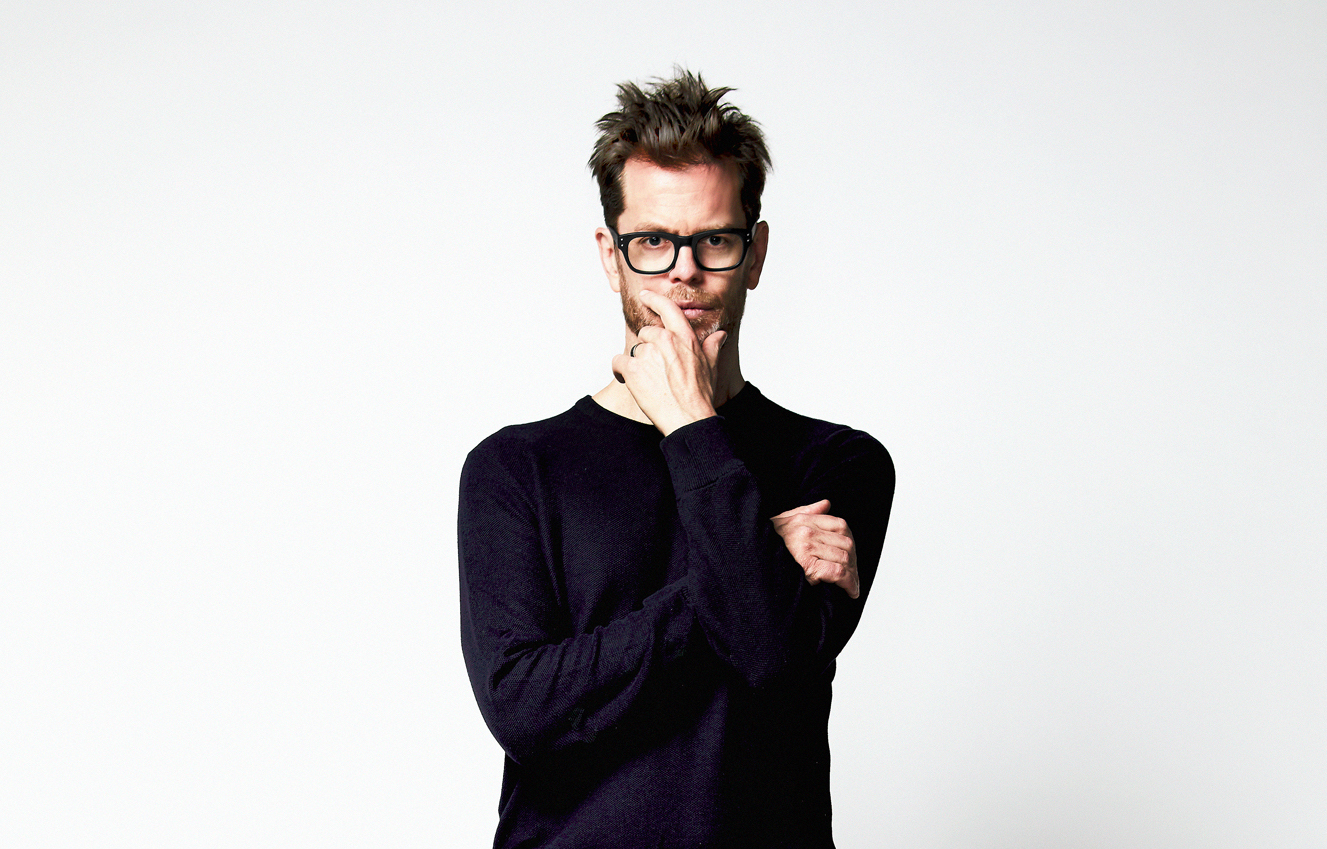
Donny McCaslin discusses the artistry of Gil Evans, collaborating with the Metropole Orkest and more
Though it may once have been, describing the Brooklyn-based artist Donny McCaslin as a saxophonist and composer no longer feels entirely sufficient. His journey from Blackstar to BLOW and beyond has seen him reinterpret his role as a band leader, invest in vocal tuition and an array of tone-altering effects pedals, as well as calibrate his approach to composition to reflect the growing significance of lyrics and song structure in his work.
Even before its arrival in October of last year, McCaslin’s critically-acclaimed album BLOW felt like it marked a turning point in his discography; a record with the potential to engage new listeners and unsettle existing ones at the same time. Yet, his contemporary hybrid of jazz and rock, with dashes of art pop and avant-garde soundcraft, has succeeded, thanks to McCaslin’s artistic conviction and experimental spirit, as much as the record’s musical reference points. Reflecting upon the response to his latest album and the reception for its material on the road, Donny feels inspired by his current artistic situation.
“The response has been positive,” he confirms, speaking shortly after completing a collaboration with the Metropole Orkest and looking ahead to shows in Canada and the UK. “I feel that it has affirmed the direction that I’m going in. In fact, we have another song coming out in about a month that’s in line with the aesthetic of BLOW, and a batch of new songs that we’re going to start unveiling over the summer as we tour, all in line with the aesthetic of BLOW.”
Donny acknowledges that he is continuing to evolve his stage shows, according to the wants of his audience and his own creative impulses. “I still kind of tinker with the live show to get the right balance, but it’s been feeling really good and I feel like I’m having more fun than I’ve ever had on the bandstand. I feel really creatively engaged with where it has been going.” One notable progression in the live arena has involved visuals. A recent hometown performance at BRIC enabled he and the band to perform with a video installation from Johnny Moreno.
Commenting on the artistic direction of the BRIC performance and the importance of visuals in conveying the emotion of music, Donny states: “I think visual art can have a really profound influence on the presentation [of the music]. It’s something I’ve been interested in for a while and BRIC was the first go at it. It was really interesting! It’s something that I want to do on a regular basis, and I just have to build towards that. It’s [about] putting all the elements in place: of course, the musical thing’s first, but then also having the means to present the visual show that we’re envisaging, that’s something that’s coming down the pipeline and I just feel like the visuals really enhance the artistic experience. So it’s something that I want to be included as much as possible in the live show.”
While he admits that July’s show at Band on the Wall is likely to come too soon for a fully-fledged A/V performance, his desire to move things forward artistically is yielding new creative opportunities for him. The most recent of those was his aforementioned collaboration with the Metropole Orkest, known for their GRAMMY award-winning collaboration with Snarky Puppy and celebrated concerts with Gregory Porter and numerous others. “The artistic director reached out to me a while back,” Donny explains, “proposing the idea of collaborating. I was a fan of the Metropole and was happy to collaborate with them. I have always wanted to do something with an orchestra on that scale, to hear my music presented on that large scale with a string section and a harp, all the woodwinds and the brass… it was really exciting!”
Donny heaps praise on the musicians and arrangers for their adaptability, suggesting that it helped the collaboration feel especially cohesive. “The arrangements were great! What the orchestra brought was just this level of expression. I think one of the things that makes them unique is: they’re really malleable stylistically. We were playing a lot of the music from BLOW, some new songs that I haven’t even presented with my small group yet and a couple of Bowie songs… they’re malleable and able to play this heavy, rhythmic style… and they’re really able to play as one entity. It felt really cohesive with them; it didn’t feel like we were dissociated from the orchestra, if that makes sense. The rhythm section: the drummer, Martijn Vink, he’s just a great drummer and this music so much relies on the bass and drum connection — and Aram [Kersbergen] their bass player’s great, so those guys were also able to step into the style and play it really well. Jason Lindner was there with me and Ryan Dahle, who is the singer and guitar player and my main songwriting partner, so it was a great collaboration. I felt it was a great fit, and we’re going to do more in the future.”
McCaslin’s comfort with large ensembles and richly orchestrated music owes a lot to the work of Gil Evans, the late pianist, arranger, composer and bandleader famous for his collaborations with Miles Davis, his unique arrangement style and for leading top notch jazz orchestras.
“He had an incredible career,” Donny says of the Canadian-born jazz icon. “His first big gig was arranging for the Claude Thornhill Big Band around World War II… it’s interesting, having played this music now for a while and come to know it, you see a lot of the seeds that come to fruition later in his career, in these early Thornhill pieces. Like, for example, there are some excerpts in one piece that I see in Sketches of Spain. There are these little kernels of ideas that he had in the late forties that he then developed and developed as his career evolved. It’s really interesting to see his imagination — with the Thornhill music again — those pieces had to be quite short: two minutes and fifty-eight seconds, let’s say, and to see the amount of content that he’s able to put into that [timeframe] and having it not feel overwritten or overbearing, still feel musical, but have all these surprises harmonically and orchestration wise – it’s really inspiring.”
Donny summarises that Evans’ pairing of instruments not usually coupled together was one of the keys to the “exotic and rich sounds” heard in his work. He describes the music made with Miles (which is often played when he joins the Gil Evans Project in New York,) as “some of my favourite music ever,” adding, “to sit in the midst of that kind of writing and orchestration, it’s just inspiring. There’s just so much profound beauty. I’ve learned a lot from that music, been inspired from it and certainly, when I’m orchestrating stuff for my own records, like on BLOW orchestrating woodwinds parts that I put together on that, I’m certainly drawing from that influence as well as others.”
Another, less immediate influence upon Donny’s work, is the political landscape around us. While his and Dahle’s lyrics often allow for more than one interpretation, a political undercurrent is certainly present in areas of the album. “I’m somebody who follows politics a lot,” Donny admits, “and I’m engaged in that sense, so I do feel like it’s reflected in the work with BLOW: the songs What About the Body and New Kindness particularly, I think can be interpreted as songs with a political undertone.”
“What About the Body: one interpretation of that is looking at what happens to the body when it’s pulled too far in either direction and things become so partisan… what happens, not necessarily to independent, middle of the road voters, but on a more metaphysical or spiritual level, what happens to the centre of the soul when it’s been ripped so far. So to me, that song does speak to that, and New Kindness for me is like the soul of the record, and part of the spirit of that song for me is: what’s the way forward? A way forward through all the strife.”
While Donny suggests that his forthcoming material draws less apparently from any political influence, he does feel that politics and society impact upon the emotion with which he plays. “I think for me it impacts me on an emotional level,” he confirms, “and that comes out when I perform and probably also, in some sense, it leads into some of the urgency of the new material.”
Looking forward, Donny is raring to hit the road and release those new songs periodically. “For me, the thing right in front of me is getting these new songs up and running while we’re touring, and also just having a nice run of dates now for the Summer, to just play this music, play with great musicians and be out there doing something that I love and that’s so deeply meaningful to me. So I’m looking forward to that! The next thing that’s coming is recording the new music, which is also something that’s going to start happening pretty soon. That’s another thing that I’m looking forward to, and that’s going to take a lot of focus — a lot of creative energy and creative imagination is going to go into that. Then, more broadly, I’m looking forward to just looking for more new music that I can enjoy and be inspired by as a listener. That’s something that’s always important for me, it’s like, going to the gym to work out or take some vitamins or something, that’s how I – probably for all of us – how we feed our creativity unconsciously is searching out and finding new music to listen to that’ll do that. You know, there’s a lot of new music coming out, so I’m looking forward to that.”
Donny McCaslin returns to Band on the Wall on Wednesday 17th July.








